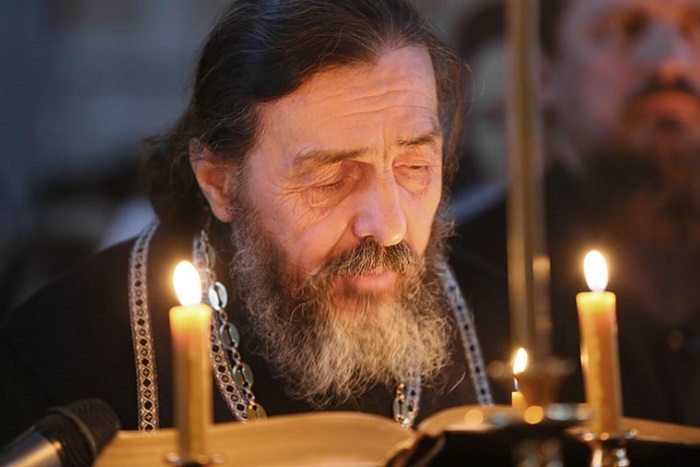
If we look closely at the holy angels, we will notice several particularities:
1. Angels exist to do the will of God. They are essentially ministerial spirits, collectively and individually fulfilling God’s will in the universe;
2. Above all, angels love the Lord, Whom they continuously praise and worship;
3. Angels are constant in doing good and can never deviate into doing evil.
Needless to say, we should try to follow their example and view their existence as the ideal of our existence, because the center of their life is God. Let us recall the exaltation hymn of the Heavenly Order, sung on the angelic day (November 21): “We magnify you, Archangels, and Angels and all the Host, Cherubim and Seraphim, glorifying the Lord.” That means that Archangels and Angels are united around the central meaning of their existence, i. e. praise of the Lord. We should live in the same way. Praising the Lord should be the center of our lives. Praise to the Lord is where the earthly church meets the heavenly Church.
Naturally, it all starts with faith. Faith is what the Lord expects to see in us. Let us recall the Gospel pericope of last Sunday…
Crowds of people surrounded the Savior. But the Gospel tells us about the bleeding woman who was healed as she touched Him with faith. Upon entering the house of Jairus, the Lord let no one enter with Him. He left only those who were able to contain and believe: Jairus, his wife, the Zebedee brothers and Peter. “Talitha, kumi!” And the girl got up. Alive. Our Lord Jesus Christ addresses the healed bleeding woman with the words that He says in the Gospel more than once or twice. “He said to her “Daughter, your faith has made you well; go in peace.””(Luke 8:48).
Faith! Everything starts with faith.
The way I see it, however, the second step after faith (or rather the second step in faith) is constancy. Just as the Holy Angels appear constant in serving God and in doing good, everything that we see in the church is also constancy. This invariable constancy is especially distinct in daily, weekly and yearly cycles of divine services. Favored by the grace of the Holy Spirit, it can be felt most powerfully in monasteries that try to follow the Church Rule as closely as possible, relying on God’s help, in becoming closer to Heaven.
“I pray night and day, but I still don’t get what I want.” people often say with bitterness, despair and despondency. In extreme cases, such words may be followed with breakdowns, disbelief, atheism, and enmity with God.
All of that is caused by a person’s failure to see the main purpose of prayer, described by the Holy Fathers. What is it? The prayer itself. The ultimate goal of prayer is prayer itself! The very act of communication with God. Prayer petitions or supplications (some material benefits, for example) are always less significant than the prayer itself. But we tend to forget about that in our desire for our intentions, often rooted in our earthly and sinful passions, to be fulfilled. But God gives not what a person wants, but what is useful to him. And more than that, He has already given us everything in prayer. We just don’t want to notice it, consumed with our passions. To us prayer is often something like a bank card that we pop in an ATM to get material benefits. This is called a utilitarian approach.
But the peace of mind and heart formed during prayer, the feeling of that mysterious Heaven suddenly opening itself to human spirit, and the presence of the One Who is always near, are much more important than our material desires. If we set our priorities in prayer accordingly, then we will understand that we have already received something that makes us closer to the holy angels in continuous praise and thanksgiving to God. Death itself will then become simply a transition to the angelic host, where we will appear before the face of God and become enlightened by His grace.
Just be constant in this praise. Don’t be petty and dull. The Lord generously grants more than we can even ask for. And that, of course, is salvation!
Translated by The Catalogue of Good Deeds
Source: https://pravlife.org/ru/content/neskolko-slov-o-postoyanstve-ili-v-chem-cel-molitvy




